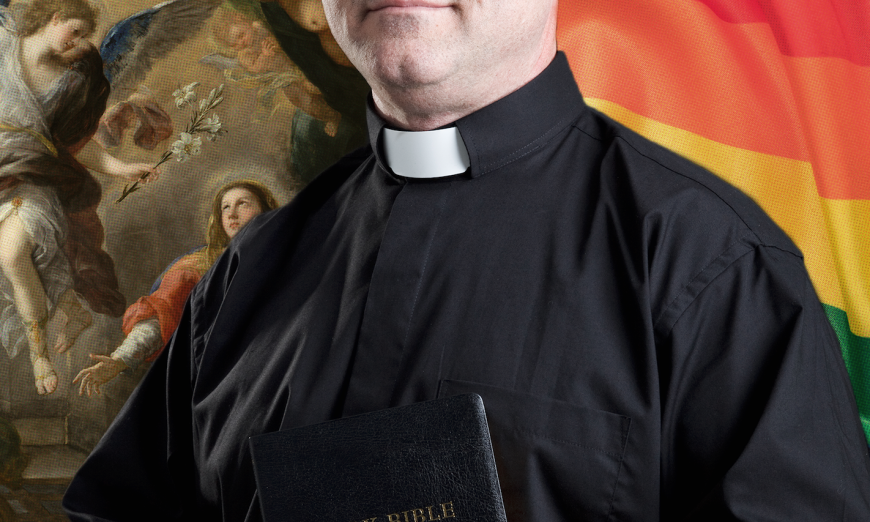Francine Orr / Los Angeles Times
Father Geoffrey Farrow is a longtime Catholic priest who revealed recently that he is gay and opposed to Proposition 8, the November ballot initiative that would overturn the California Supreme Court’s decision earlier this year allowing same-sex marriage. As a result, Farrow has been stripped of his job as a parish priest in Fresno, including his salary and health benefits.
Steve Lopez
October 26, 2008
So who is this Catholic priest from Fresno who stood up and spoke out against Proposition 8, putting his career on the line? As a gay man who finds the church’s views on homosexuality so objectionable, why has he been a priest for more than 20 years and subjected himself to such moral conflict?
After reading my colleague Duke Helfand’s story about Father Geoffrey Farrow and his recent career-suicide from the pulpit, I was curious.
Farrow agreed to meet me for lunch in the middle of a schedule that’s gotten very busy since he became persona non grata to his employer. He’s been asked to appear all over the state for rallies against Prop. 8, which would amend the California Constitution to say marriage can only be between a man and a woman.
Father Farrow, who was suspended by his bishop two weeks ago, strolled into the lobby of the Kyoto Grand Hotel in downtown Los Angeles wearing the collar.
“I’m still a priest,” he said over lunch, though he fully expected to be disciplined for speaking to his congregation about Prop. 8 and wouldn’t be surprised if he’s ultimately fired.
For the moment, he’s staying with friends in Los Angeles. Farrow, 50, doesn’t know what he’ll do after the election. He was suspended without pay and said his medical benefits run out at the end of the month.
Farrow, who lived in Cuba until the age of 4, grew up Catholic in Florida and knew as a teenager that he was gay. He dated girls “to keep up appearances” but was miserable about it, and he began questioning his faith.
“If God is omnipotent, why is there evil in the world?” he asked himself as body bags returned to the U.S. from Vietnam.
He looked into agnosticism and atheism, neither of which offered the answers he wanted. In his first year of college in Florida, he studied philosophy, read Cicero and mused on the meaning of history, civilization and the nature of God.
“I have a hunger for the transcendent,” Farrow said. “This is too precise,” he said of man and the universe, “to be a coincidence.” And so he became a believer, once more, in the church he had been “carried to in diapers.”
When I told Farrow that as an agnostic, I don’t understand that leap, he described God as love and faith as trust.
“Trust is fundamental of all human relationships,” he said. “Part of the attraction of the relationship with that person is that you’re always familiar with them and yet always discovering them.”
I love and trust my wife, I said, but she’s real and doesn’t need to prove that she exists.
“Precisely,” Farrow said with a smile, as if I’d described his relationship with God.
When his family moved from Florida to Redondo Beach in the 1970s, Farrow, still closeted as a gay man, joined St. John’s Seminary in Camarillo.
Is it possible, I asked, that becoming a priest was a way of avoiding coming to terms with his sexuality? Farrow had, after all, once prayed to God to “please make me normal, please make me normal.”
“That’s a valid question,” he said, but he believes he was addressing his spiritual rather than sexual identity in becoming a priest.
Wasn’t it a suffocating compromise? I asked. He had given himself over to a church that has, despite moderating its views in recent decades, condemned homosexuality and marginalized gays, even though in Farrow’s opinion a sizable percentage of priests are gay. Farrow conceded that he has considered church teachings “monstrous,” especially given the history of violence and suicide victimizing gays. But he said he has always believed in the church, if not in the men who led it. It’s like loving a family member despite a falling out, or loving your country even as you doubt its leaders.
“I’m not happy with the current administration,” Farrow said, “but I haven’t shredded my passport.”
I asked if he’d had any relationships while serving as a priest.
http://www.latimes.com/news/columnists/la-columnist-slopez,0,7768178.columnist

